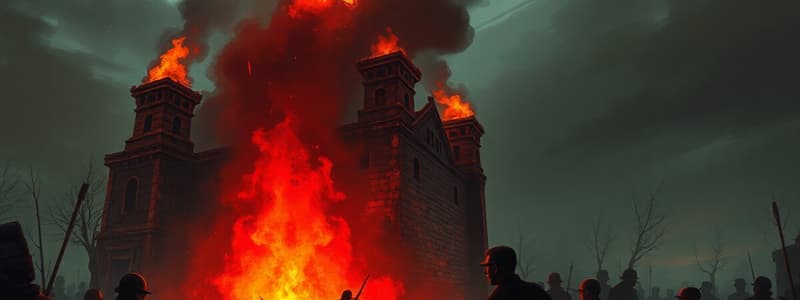Podcast
Questions and Answers
What was the primary target group during the Holocaust?
What was the primary target group during the Holocaust?
- Romani people
- Communists
- Disabled individuals
- Jews (correct)
The Nuremberg Laws were designed to protect the rights of Jews in Germany.
The Nuremberg Laws were designed to protect the rights of Jews in Germany.
False (B)
What is the term used to describe prejudice, discrimination, or hostility towards Jews?
What is the term used to describe prejudice, discrimination, or hostility towards Jews?
Anti-Semitism
The violent pogrom that escalated violence against Jews on November 9, 1938, is known as __________.
The violent pogrom that escalated violence against Jews on November 9, 1938, is known as __________.
Match the following terms with their descriptions:
Match the following terms with their descriptions:
What was one method used by the Nazis for extermination during the Holocaust?
What was one method used by the Nazis for extermination during the Holocaust?
The Holocaust resulted in the deaths of less than one million people.
The Holocaust resulted in the deaths of less than one million people.
Who orchestrated the Holocaust?
Who orchestrated the Holocaust?
Anti-Semitism provided fertile ground for Hitler and his __________ to gain power.
Anti-Semitism provided fertile ground for Hitler and his __________ to gain power.
What did the Holocaust primarily signify?
What did the Holocaust primarily signify?
Flashcards
Genocide
Genocide
The systematic and planned extermination of a specific group of people.
Antisemitism
Antisemitism
Intense hatred and prejudice against Jews, rooted in centuries of discrimination and persecution.
Pogroms
Pogroms
A series of violent attacks against Jewish communities, often involving destruction of property and physical assaults.
Kristallnacht
Kristallnacht
Signup and view all the flashcards
Third Reich
Third Reich
Signup and view all the flashcards
Nuremberg Laws
Nuremberg Laws
Signup and view all the flashcards
Concentration camps
Concentration camps
Signup and view all the flashcards
The Holocaust
The Holocaust
Signup and view all the flashcards
Mein Kampf
Mein Kampf
Signup and view all the flashcards
Lessons from the Holocaust
Lessons from the Holocaust
Signup and view all the flashcards
Study Notes
The Holocaust: A Summary
- The Holocaust was a genocide during World War II, orchestrated by Adolf Hitler and the Nazi regime.
- It involved the systematic persecution and extermination of millions, primarily targeting Jews but also other groups.
- Anti-Semitism, prejudice against Jews, fuelled the Holocaust's roots.
- Historical persecution of Jews, like pogroms, preceded the Holocaust.
Nazi Rise to Power and Ideology
- Hitler's anti-Semitic beliefs were outlined in Mein Kampf.
- The Nazis gained power in 1933, establishing a totalitarian regime (the Third Reich).
- The Nuremberg Laws stripped Jews of their rights, isolating them from German society.
- Kristallnacht (Night of Broken Glass, November 9, 1938), a violent pogrom against Jews, escalated persecution.
Concentration Camps and Genocide
- The Nazis established concentration camps across Europe for mass murder and forced labor.
- Victims included Jews, Romani people, disabled individuals, political dissidents, and LGBTQ+ individuals.
- Genocide, the deliberate killing of a group of people, was the Nazis' goal. This was implemented through mass shootings, gas chambers, and forced labor.
Impact and Significance
- An estimated six million Jews and millions more perished.
- The Holocaust serves as a cautionary reminder of the dangers of hatred, prejudice, and unchecked intolerance.
- Lessons learned underscore the need for vigilance, understanding, and tolerance to prevent future atrocities.
Studying That Suits You
Use AI to generate personalized quizzes and flashcards to suit your learning preferences.




